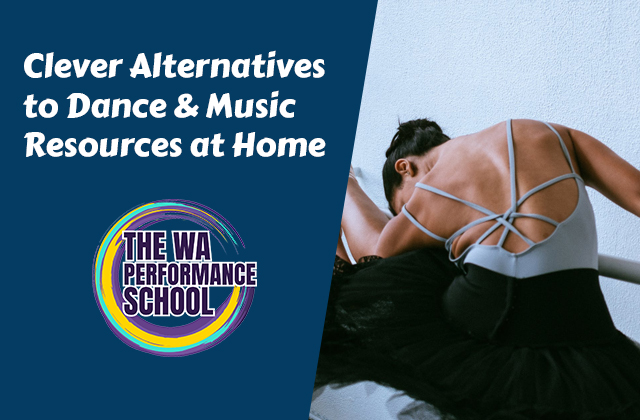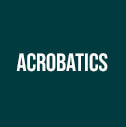Clever Alternatives to Dance & Music Resources at Home

Learning from home is fun, familiar, and a great way to stay active and creative when you can’t attend classes in person! To help you learn from home even better, our teachers have put together their top recommendations for DIY dance & music resource alternatives.
1. Ballet Barres
Ballet Barres provide vital support for students performing certain ballet skills. They allow students to maintain their balance while focusing on technique (they’re definitely not for leaning on!). Some local providers produce wonderful in-home ballet barres, whether fixed or portable, but if you don’t have one at home, we can recommend using the following for support:
– The kitchen bench
– A windowsill of the correct height
– Bookshelves
Any solid or stable surface at the correct height for you should be suitable. If you are an advanced senior or adult student, you may even like to try some exercises off the barre, to work on your balance and core strength.
2. Yoga Blocks
Need some yoga blocks to increase a stretch, or as a grip to practise the port des bras for a pirouette? Head to the kitchen! Find yourself a clean and dry plastic food container to use instead. Depending on whether your exercise is weight-bearing, you could also use a book, or a tissue box!
3. More Uses for Books
Apart from reading a good book in your downtime, you can also use a book to balance on your head while you walk or perform an exercise, maintaining posture and balance. This can even be done with early childhood students, perhaps with a beanbag on the head instead! It’s a great way for children to understand their movements and gross motor skills. You can use a thin book or even just a sheet of paper, held between your legs without dropping it, which is great for holding inner thighs and stretching legs.
4. DIY Percussion
If your music student needs to practise rhythm, beat or ostinatos, sure, they could clap away to their heart’s content – but why not have some fun! Try making your own percussion instruments, here are our top three suggestions:
– Bang away on pots and pans! All you need is a saucepan and a wooden spoon. In fact, our Pre-Junior Tap Dance students did exactly that this week in their virtual lessons at home (sorry parents!)
– Make your own Rainmaker. A rainmaker or shaker is a simple plastic or tin container, usually cylindrical, filled with small hard objects such as dried beans, lentils, or rice. This can be shaken on the beat, like a maraca, or it can be tipped more slowly and gently for young children to make gentle rain noises – this works even better if it’s a long container.
– Spoons! In some of our WAPS music class segments this week, our students are learning how to play the spoons! Even plastic spoons or sporks work well for this – it’s all about your grip and control. With some practise, you’ll be a spoon champion in no time!
5. Music Reading Comes to Life!
If your young music student is learning about note-reading and needs some help, why not get creative. As the musical staff is just five parallel lines, all you need to recreate one in your home is a surface and a way to make a mark. Whether you draw them on a piece of paper, on the bathroom mirror with whiteboard marker, or our favourite suggestion:
A Giant Staff on your living room floor! You can use masking tape or skipping ropes to lay them flat on the lounge room floor, and ask students to jump on the line or space that you specify – it’s great fun and keeps kids active too.
6. Sore Knees? Try these..
Don’t have knee pads to use at home? Try this helpful but rather unfashionable idea – fold a tea towel into a square, and push it down the front of your leggings so it sits over your knee – one for each leg, and there you have it, some softness on those knees!
7. Another Tea Towel Solution
You can also use a tea towel, regular towel, scarf, or other fabric as an alternative to a stretching strap or resistance band. This can help you with stretching and flexibility
Do you have some great advice or DIY tips to share? Contact us and you can contribute to our next blog post on the subject!
Further Reading?
– Blog Post: Tips on Setting up a Home Learning Space
– YouTube: Tips on Setting up your Devices

























 Studio: 3 Price Street, SUBIACO WA 6008
Studio: 3 Price Street, SUBIACO WA 6008


